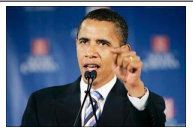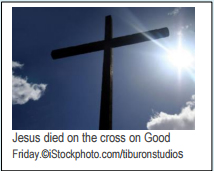| Members of different churches mark the day in various ways. Some churches, especially Catholic churches, see Good Friday as a fast day and people only eat three small meals and, often, no meat at all. Some people substitute meat with fish. Many churches hold special services and some may hold long prayer vigils.Traditionally, people eat hot cross buns on Good Friday. These are small, bread-like buns flavored with spices and raisins or currants. Some modern recipes add cocoa to the the dough and replace the dried fruit with chocolate chips. All hot cross buns are marked on the top with a cross. The cross is sometimes cut into the top of the bun and sometimes made with a different, paler dough. Some people eat hot cross buns just as they are and others split them in half, toast them, spread them with butter, jam or cream and eat them warm.
A lot of sporting events are held on or start on Good Friday. The Three Peaks Race in Tasmania starts in the afternoon of Good Friday. This event is threetiered , consisting of a section to be sailed and a section to be walked or run. During the sailing sections, all members of a given team sail a set course down Tasmania’s west coast. During each of the running or walking sections, two members of each team leave their boat and run or walk up and then down one of three mountains. Other well-known sporting events that start on Good Friday are the Brisbane to Gladstone yacht race, the Stawell Easter Gift, a long distance running race and the Easter Racing Carnival in Sydney. Good Friday commemorates the crucifixion of Jesus Christ and is a day of mourning for Christians. It is a very important day in church calendars, as the crucifixion and resurrection of Jesus are central events in Christian beliefs. The Easter date depends on the ecclesiastical approximation of the March equinox. For many people who are members of other faiths or are not particularly observant, Good Friday is not a day of religious observance, but the start of a four-day weekend at the end of the summer. For some, it is a good opportunity to take a short vacation or spend time with family or friends. Others use the time to carry out maintenance on their homes or cars or to attend sporting events |
Does Cinnamon Interact With Other Herbs or Drugs? |
| Because cinnamon may lower blood sugar levels, exercise caution when combining it with other supplements that lower sugar levels, including: Alpha lipoic acid: Bitter melon: Chromium: Devil’s claw: Fenugreek: Garlic Horse chestnut: Panax: Siberian ginseng: Psyllium The same holds true with diabetes medications. If you and your doctor decidecinnamon is right for you, pay close attention to your blood sugar levels. Let your doctor know if your blood sugar levels fall too low. Taking cinnamon with drugs that affect the liver may increase the risk of liver problems. |
Obama the Theologian |
| Ross Douthat |
 |
| PRESIDENT OBAMA, like many well-read inhabitants of public life, is a professed admirer of Reinhold Niebuhr, the famous mid-20th-century Protestant theologian. And more than most presidents, he has tried to incorporate one of Niebuhr’s insights into his public rhetoric: the idea that no society is innocent, and that Americans in particular need to put aside illusions about our own alleged perfection.The latest instance came at last week’s National Prayer Breakfast, when the president, while condemning the religious violence perpetrated by the Islamic State, urged Westerners not to “get on our high horse,” because such violence is part of our own past as well: “During the Crusades and the Inquisition, people committed terrible deeds in the name of Christ. In our home country, slavery and Jim Crow all too often was justified in the name of Christ.” These comments were not well received by the president’s critics — as, indeed, his Niebuhrian forays rarely are. In the past, it’s been neoconservatives taking exception when Obama goes abroad and talks about our Cold War-era sins. This time, it was conservative Christians complaining that the president was reaching back 500 or 1,000 years to play at moral equivalence with people butchering their way across the Middle East. From a Niebuhrian perspective, such complaints are to be expected. “All men,” the theologian wrote, like to “obscure the morally ambiguous element in their political cause by investing So the president probably regards his critics’ griping as a sign that he’s telling necessary truths. Indeed, sometimes he is. Certainly the sweeping Wilsonian rhetoric of George W. Bush cried out for a corrective, and Obama’s disenchanted view of America’s role in the world contains more wisdom than his Republican critics But the limits of his Niebuhrian style have also grown apparent. The first problem is that presidents are not historians or theologians, and in political rhetoric it’s hard to escape from versimplication. You can introduce the Crusades to complicate a lazy “Islam violent, Christianity peaceful” binary, but then a lot of NYT |











No Comments